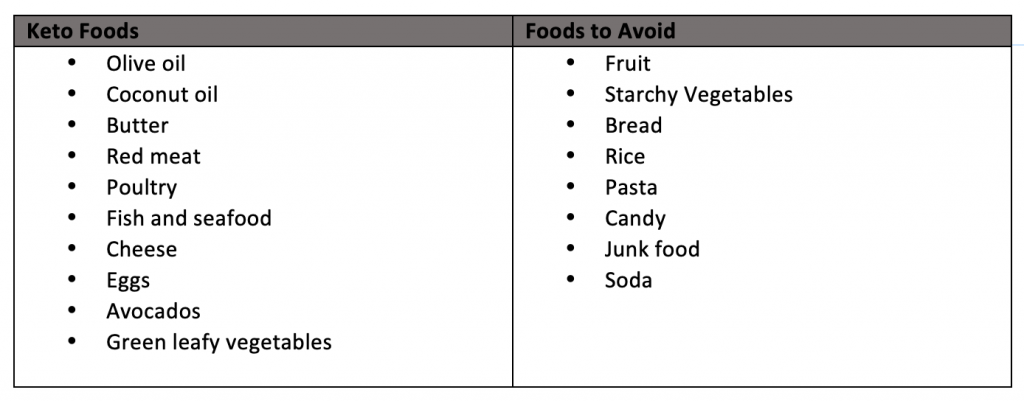The Effects of Exercising On a High Fat Diet

Hunter Bennett
When it comes to diet, there is an incredible amount of information out there – but unfortunately, most of it is somewhat conflicting.
There are certain individuals who swear by a high carbohydrate diet, while others will state that adhering to a paleo way of eating is not only the best for health, but also unquestionably the best for performance.
Add in the Atkins diet, the carnivore diet, the 5 and 2 fasting diet, and the list just goes on.
Now I should state that I truly believe that almost every way of eating has its pros and cons. Many different diets can be used in certain situations, and with a certain outcome in mind, with great success.
However, in my opinion, the most important thing comes down to if it works for you.
As a result, you shouldn’t be afraid to try new ways of eating (assuming they have some research to support them) to establish what works for you on an individual level.
And one way of eating that has been making a huge splash in the health industry of late is the ketogenic diet.
What is the ketogenic diet?
The ketogenic diet describes a way of eating that is high in fat intake, moderate in protein intake, and extremely low in carbohydrate intake (Westman, 2003).
I should add that when I say low, I really do mean low.
In fact, it is not uncommon for some people following the ketogenic diet to eat as little as 10 grams of carbohydrates per day (although 10-50 grams is often considered about normal), of which most will come from fiber.
To put this into perspective, a medium apple contains about 20 grams of carbohydrates.
Now, you might be wondering why in the world someone would want to restrict their carbohydrate intake to a mere 10 grams per day – and the reasons may surprise you.
Related Article: Does the Keto Diet Affect High-Intensity Exercise Performance?
What are the benefits of the Ketogenic diet?
The primary reason that the ketogenic diet requires such a low carbohydrate intake is to get the body into a state of ketosis.
As most of you would know, your body has the capacity to use both glucose (from carbohydrates) and fatty acids (from fats) to produce energy. However, if your body has limited carbohydrate stores (and subsequently runs out of glucose), then it will alternatively increase the rate at which it breaks down fats for energy.
Interestingly, the body produces Ketones during this process, which are essentially a by-product that come with fat metabolism.
Taking all of this into consideration, Ketosis essentially refers to a state where fats are the primary source of energy within the human body, and your body is also producing higher amounts of ketones as a result.
Now getting into ketosis through the ketogenic diet appears to have a myriad of interesting benefits.
Ketogenic Diet and Cognitive Function
Somewhat surprisingly, the ketogenic diet was first used as a treatment for childhood epilepsy in the 1920s.
It was realized that if starved of glucose, the brain will start using these unique compounds known as ketones to produce energy – and interestingly, the brain appeared to function more efficiently when using ketones for energy, than when using glucose.
As a result, when applied to those with epilepsy, the ketogenic was extremely effective at reducing the incidence of seizures.
More recently, being in a dietary-induced state of ketosis has also been shown to improve cognitive function and higher ordering processing capabilities (Krikorian, 2012), suggesting some key benefits for the mental state.
Ketogenic Diet and Health
In conjunction with the apparent mental benefits, the ketogenic diet also appears to have some impact on certain aspects of physical health as well.
On this diet, you initially see a large increase in your body’s capacity to use fat for energy.
Ultimately, due to a force of circumstance, the body becomes more efficient at mobilizing fat from your adipose tissue and then breaking down fatty acids for energy.
This has been shown to contribute to reductions in fat mass, improvements in blood sugar levels, reductions in resting blood pressure, and vastly improved blood cholesterol levels – all of which have the potential to contribute to a reduced risk of cardiovascular disease and diabetes (Paoli, 2013; Vargas, 2018).
Which is all very positive, really.
How does a ketogenic diet affect exercise performance?
Although the evidence to support the use of the ketogenic diet from a pure health perspective is quite apparent, less is known about its impact on exercise performance.
Ketogenic Diet and Endurance Exercise Performance
As previously mentioned, we have the potential to use both carbohydrates and fats for energy.
While fats provide more energy per gram than carbohydrates, at higher exercise intensities the human body preferentially uses carbohydrates for energy because they are more easily broken down.
However, our carbohydrates stores are finite – and after they have been exhausted, the body is forced to break down fats to meet all your energy needs.
A primary factor that contributes to deteriorating performance capacity during exercise appears to be reduced carbohydrate availability in conjunction with an inability to effectively use fats for energy.
As a result, current fuelling tactics tend to emphasize high-carbohydrate intakes both before and during exercise to inhibit fat utilization, and therefore prolong carbohydrate metabolism.
But recent research suggests that this may not be the best approach to take.
If the body becomes adapted to using fats for energy through the prolonged use of a ketogenic diet, it appears to produce energy in a more efficient manner from fats during endurance activities. Through this interaction, it appears to have a positive effect on long-duration endurance exercise performance (Volek, 2015; Chang, 2017).
So, if you are into marathon running, long-distance cycling, triathlons, or anything else of that nature, then the ketogenic diet could be for you.
However, it is important to note that a period of adjustment is required, in which the body may require up to 12 weeks of following a strict ketogenic diet to become fully ‘fat-adapted’.
Ketogenic Diet and HIIT Performance
So what about the keto diet and HIIT?
Now, the benefits associated with using the ketogenic diet during long-duration aerobic exercise activities can be put down to the fact that you are performing the bulk of your exercise below lactate threshold – in which you are predominantly relying on the aerobic system for energy production.
 However, HIIT requires exercise above lactate threshold – which requires a lot of input from the anaerobic energy system.
However, HIIT requires exercise above lactate threshold – which requires a lot of input from the anaerobic energy system.
Now, this isn’t ideal, because anaerobic metabolism can only use carbohydrates for energy, and not fats.
As a result, following a ketogenic diet can actually inhibit your ability to perform high-intensity physical activity (such as HIIT). This makes it less than ideal for those individuals who actively participate field sports or shorter track events (Change, 2017; Wroble, 2018).
Your high-intensity exercise performance is inhibited when on the ketogenic diet, but performing regular HIIT training session under these circumstances can still cause significant improvement in both your body composition and your fitness (Cipryan, 2018).
As a result, if you are looking to perform HIIT training for the health benefits, but not looking to compete in any completive sports, the ketogenic diet still offers a very good option.
What are the cons of the Ketogenic diet?
I have already touched on the fact that high-intensity exercise performance is reduced when following a ketogenic way of eating.
However, there is also one other negative that needs consideration.
When initially excluding carbohydrates from the diet, some people experience withdrawal-like symptoms for a brief period. Then their body adapts to the requirements of using fat as a main source of fuel.
These symptoms can include lethargy, mental fuzziness, headaches, muscle cramps, and fatigue (Kossoff, 2009).
While these symptoms do tend to dissipate after a week or two, they can be enough to put some people off the ketogenic diet completely.
Does the Ketogenic diet impact your energy levels?
While during the first two weeks following a keto way of eating your energy levels can certainly take a hit, this doesn’t seem to be the case once you have become adjusted to the metabolic demands placed on the body.
In fact, recent research has shown that after this adaptation period, individuals tend to find themselves feeling quite good on the ketogenic diet.
This comes with increases in perceived energy levels, heightened sensations of mood and general wellbeing. There is even a substantial increase in a cognitive state – indicating that overall, it may have a rather positive effect on your energy levels (Zinn, 2017).
Related Article: High-Intensity Interval Training: How to Meet Nutritional Demands
Women vs Men on the Ketogenic diet
Now, for the most part, the effects of the ketogenic diet appear quite consistent in both men and women.
Both men and women appear to experience similar improvement in cognitive function and mental health, similar increases in cardiovascular and metabolic health, and similar implications for exercise performance.
However, there is some very recent research that suggests there may indeed be a small point of difference.
After menopause, women tend to see much higher rates of cardiovascular disease than they do pre-menopause. While this could be put down to strictly environmental factors, there is a suggestion that it could also be physiological.
After menopause women see significant increases in systemic inflammation, associated with subsequent declines in antioxidant status – both of which significantly increase the risk of developing cardiovascular risk factors.
Now interestingly, each of these is thought to be exacerbated by highly processed carbohydrates.
Alternatively, early research indicates that females who both actively participate in exercise and use a keto diet see huge reduction in inflammation, with large improvements in antioxidant status – thus reducing cardiovascular risk.
Moreover, these improvements appear to be greater than in those who implement exercise with a moderate carbohydrate diet (or a normal way of eating).
While it is important to note that these results are limited to animal studies, it does indicate that post-menopausal women may see even further health benefits from the keto diet (Varga, 2018).
Examples of Ketogenic foods
If you do decide to implement the ketogenic diet into your routine, I wanted to provide an outline of some of the best keto foods you can eat, and those you can’t.
What are the risks associated with the Ketogenic diet?
You might be wondering if the keto diet is safe – and for the most part, it is. Although there are a few certain circumstances that may require some attention.
As the keto diet can lower blood sugar, it may not be completely suitable for some individuals with Type I diabetes (Leow, 2018).
Some individuals have also reported digestive discomfort on the keto diet.
Finally, the ketogenic diet is perceived as quite restrictive, as it involves the exclusion of a lot of foods. While this can make it somewhat of a challenge to stick to in certain situations, I wouldn’t consider a true risk – however, it is worth mentioning.
Take Home Message
The ketogenic diet is a way of eating that has been making waves in the health industry of late, despite being first introduced nearly a century ago.
With this in mind, it appears to have merit for those looking to enhance cognitive, cardiovascular, and metabolic health, while also causing improvements in endurance specific exercise performance and overall wellbeing.
So, if this sounds like your cup of tea, it could be well worth giving a go!
References
Westman, Eric C., et al. “A review of low-carbohydrate ketogenic diets.” Current atherosclerosis reports 5.6 (2003): 476-483.
Krikorian, Robert, et al. “Dietary ketosis enhances memory in mild cognitive impairment.” Neurobiology of aging 33.2 (2012): 425-e19.
Vargas, Salvador, et al. “Efficacy of ketogenic diet on body composition during resistance training in trained men: a randomized controlled trial.” Journal of the International Society of Sports Nutrition 15.1 (2018): 31.
Paoli, Antonio, et al. “Beyond weight loss: a review of the therapeutic uses of very-low-carbohydrate (ketogenic) diets.” European journal of clinical nutrition 67.8 (2013): 789.
Chang, Chen-Kang, Katarina Borer, and Po-Ju Lin. “Low-carbohydrate-high-fat diet: Can it help exercise performance?.” Journal of human kinetics 56.1 (2017): 81-92.
Volek, Jeff S., Timothy Noakes, and Stephen D. Phinney. “Rethinking fat as a fuel for endurance exercise.” European journal of sport science 15.1 (2015): 13-20.
Wroble K et al., “Low-carbohydrate, ketogenic diet impairs anaerobic exercise performance in exercise-trained women and men: a randomized-sequence crossover trial.” The Journal of sports medicine and physical fitness (2018).
Cipryan, Lukas, et al. “Effects of a 4-Week Very Low-Carbohydrate Diet on High-Intensity Interval Training Responses.” Journal of sports science & medicine 17.2 (2018): 259.
Kossoff, Eric H., and Jong M. Rho. “Ketogenic diets: evidence for short-and long-term efficacy.” Neurotherapeutics 6.2 (2009): 406-414.
Zinn, Caryn, et al. “Ketogenic diet benefits body composition and well-being but not performance in a pilot case study of New Zealand endurance athletes.” Journal of the International Society of Sports Nutrition 14.1 (2017): 22.
Varga, Csaba, et al. “The Effects of Exercise Training and High Triglyceride Diet in an Estrogen Depleted Rat Model: The Role of the Heme Oxygenase System and Inflammatory Processes in Cardiovascular Risk.” Journal of Sports Science & Medicine 17.4 (2018): 580.
Leow, Z. Z. X., et al. “The glycaemic benefits of a very‐low‐carbohydrate ketogenic diet in adults with Type 1 diabetes mellitus may be opposed by increased hypoglycaemia risk and dyslipidaemia.” Diabetic Medicine (2018).
You Might Like:













